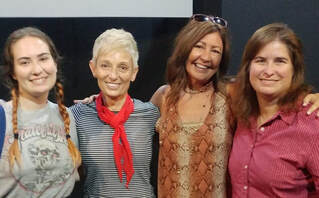|
I’m not generally given to bragging but when it comes to the what-if game, I might be one of the best. As an adoptee, it’s an easy game to play. We’re born knowing its rules and we grow up with its questions. What if she hadn’t given me up? What if I’d been closer with my adoptive parents? What if I’d been less fearful of rejection? Adoptee daydreams and fantasies are made of this. I rarely live in the moment because I’m too busy worrying, wondering, planning, being two steps ahead. So when my brother Miles and I moved my mum into a care home 8 years ago, the decision was based on what-if logic. I was living in Austin. My brother lived in London but he often traveled. My mum had been diagnosed with Alzheimer’s four years earlier and the disease was progressing. What if she had another fall and her home help wasn’t there? What if she couldn’t reach us, or forgot how to? It was time to make the move. The first few weeks in the care home were nerve-wracking. Miles and I repeated the same lies over and over - ‘you’re just here for a few days until you get better’. Friends from her village came to visit and encouraged her to remember names and places while I frantically signalled them to stop. Our biggest fear was that she would have a moment of clarity and realize what had happened. That we had sold the house that she’d lived in for 45 years so that we could afford the fees to move her into a care home. Even at its best, the care home was not a comforting place to be. Alarms going off, residents upset, staff bustling in and out. Every time I flew over to visit I would steel myself with the same thought: What if this is the last time that you see her? It helped temper my irritation and frustration. At least for the first few days. When mum fell and broke her hip a second time we were faced with a whole new set of uncertainties. What if the care home wouldn’t take her back because she was no longer sufficiently mobile? What if we used up all of her private funding and had to find a council place? Both scenarios came true, simultaneously. And so almost two years ago, at the age of 93 we moved my mum again. Happily, it turned out to be the best move we could have made. She now lives in a nursing home with a high level of care and an environment that feels calm, happy and loving. The only outbursts come from the resident green parrot, Alfie, who enjoys a good swear now and again to everyone’s amusement. The staff post daily photos of residents enjoying activities. I was about to fly to England when COVID-19 struck and the care homes closed to outside visitors. Of course I still worry over the what-ifs, especially seeing headlines that care home residents will be the hardest hit by the virus. If she takes a turn for the worse while they are in lockdown then I won’t be able to visit. But this time there is little I can control and have to make peace with that. If I don’t see her again I’ll at least know that she spent her days with people who genuinely care for her. And I’m learning to forgive myself too, because although neither my adoptive parents nor I could truly be what the other most wanted, I also know that I tried my best. And so did they.  British-born writer and performer Maggie Gallant has lived in Austin with her husband, Erik, since 2000. Her solo show 'Hot Dogs at the Eiffel Tower' chronicles Maggie's life-long search for her birth father, 'French Papa'. Maggie was honored to perform the show at the AKA Conference in 2015. After many further twists and turns in the story, an updated version of Hot Dogs played at the Winnipeg Fringe in 2019 followed by a five-week run at the Hyde Park Theatre in Austin, Texas. Maggie continues to write for the stage on all aspects of the adoptee experience.
0 Comments
|
Back to Main BlogNewsletter ArchivesBlog Archive
July 2024
Categories |
 RSS Feed
RSS Feed